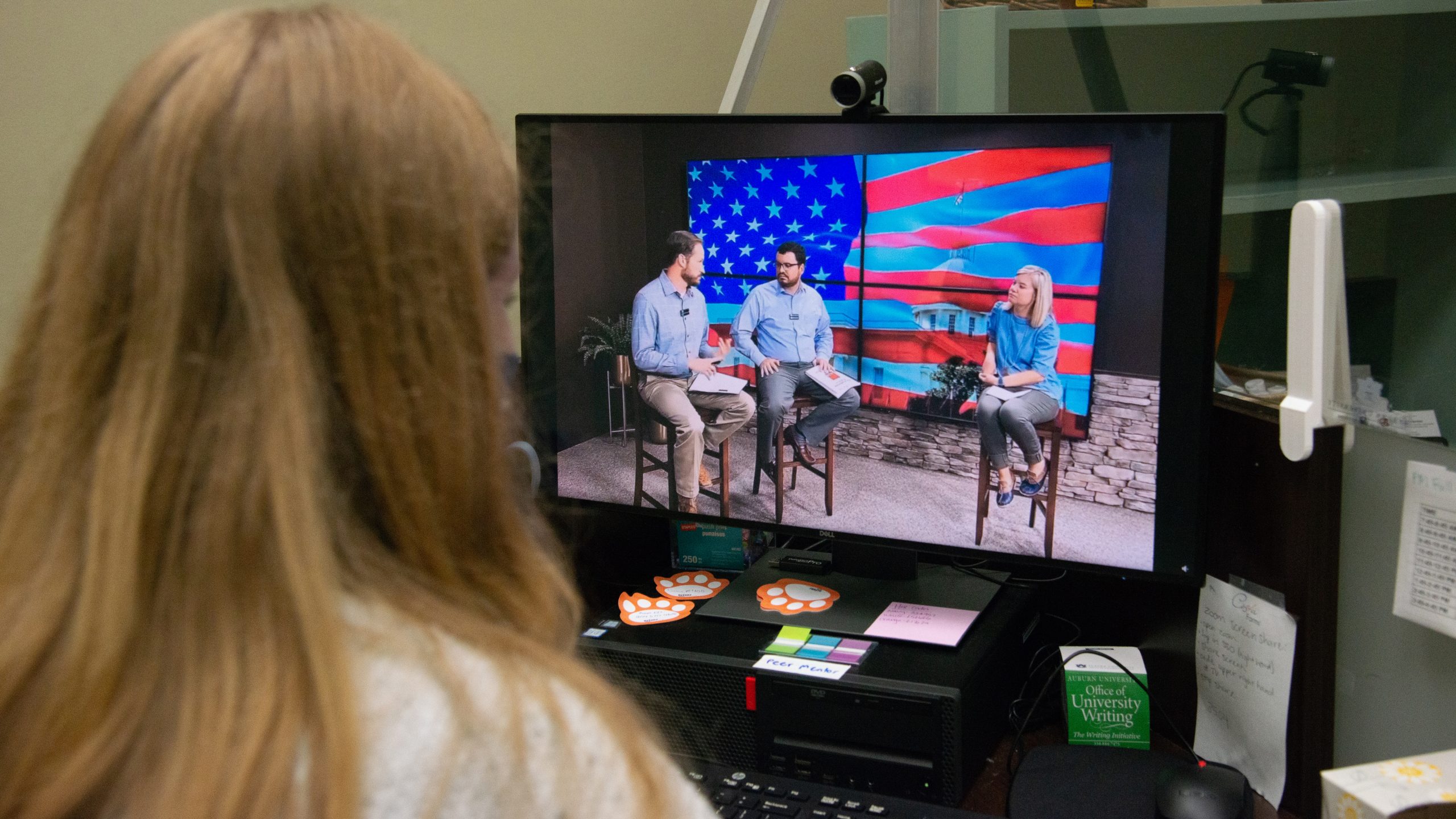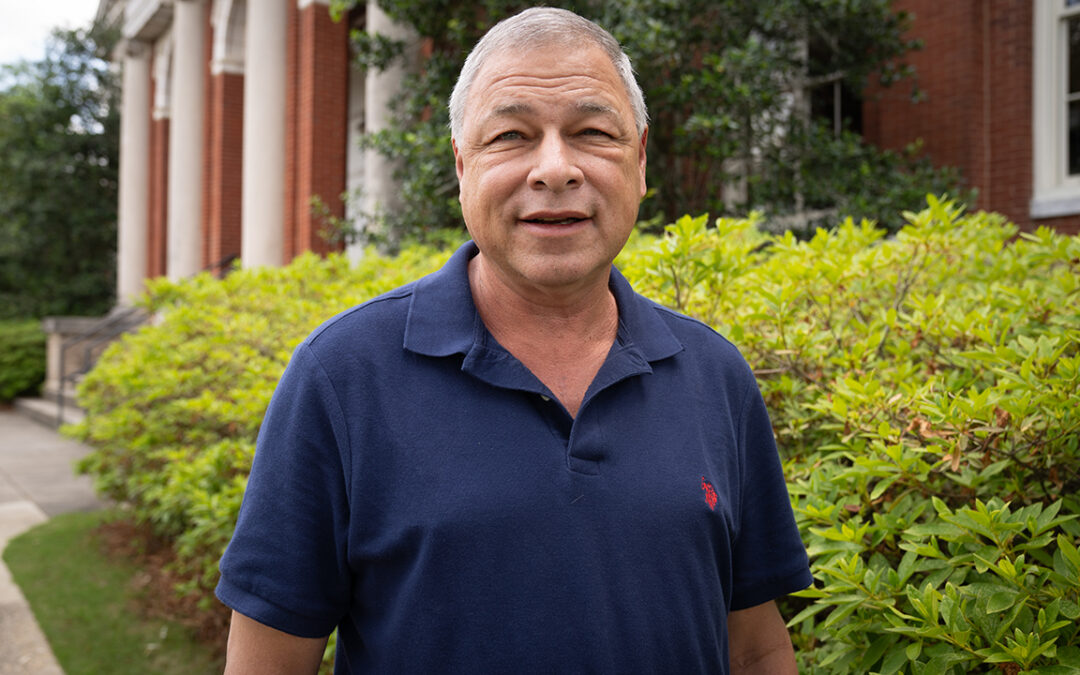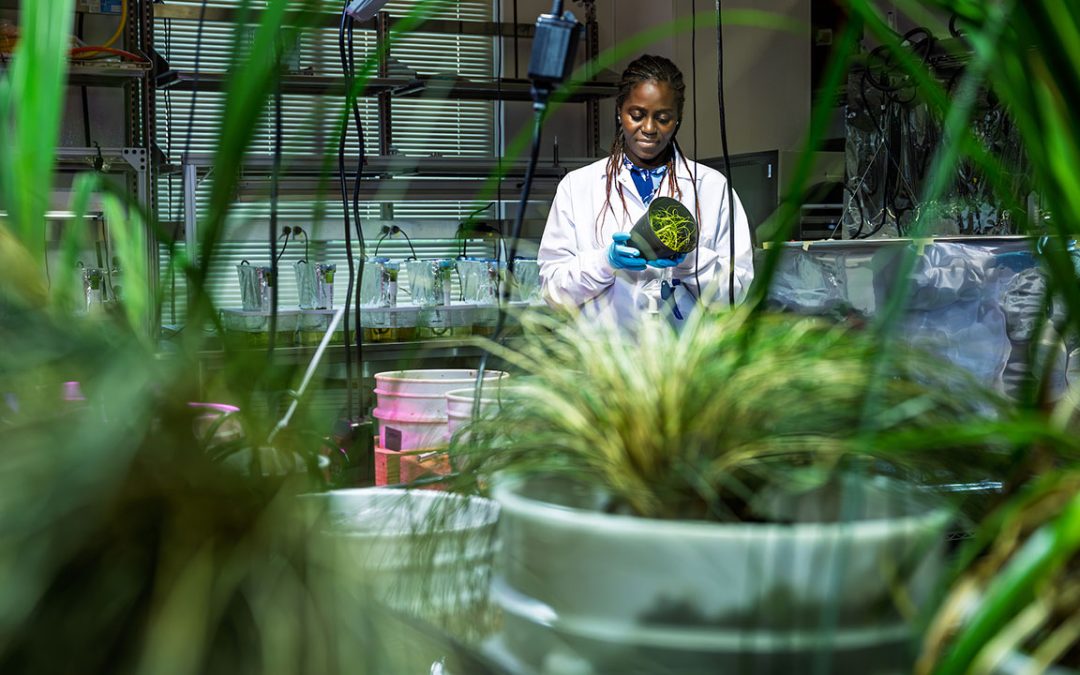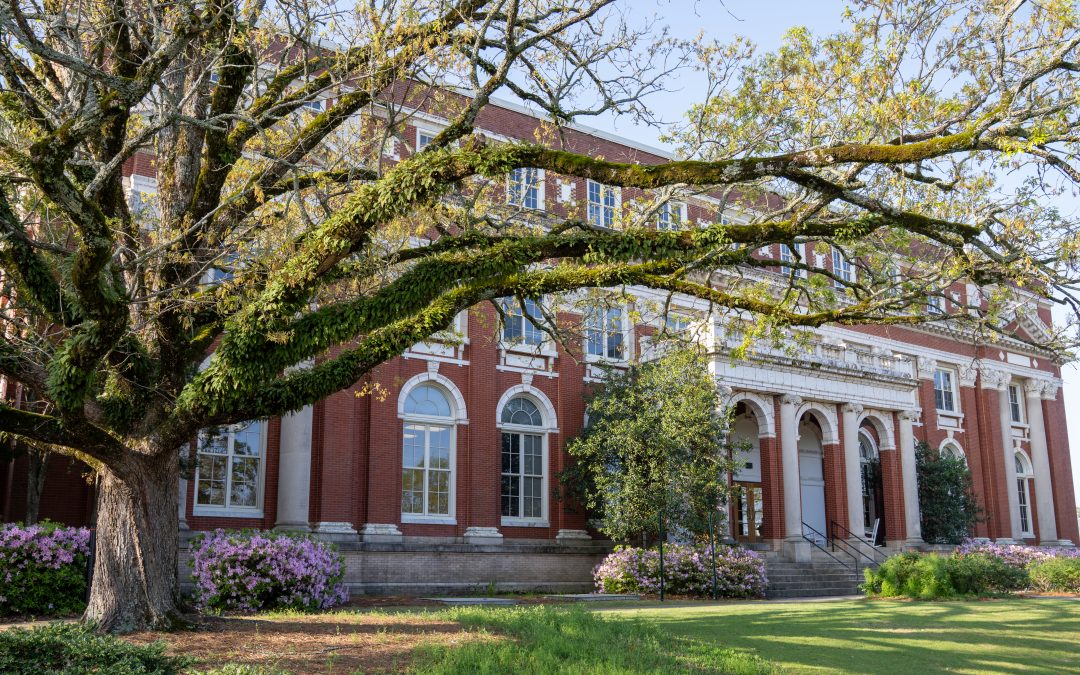On a warm morning, despite COVID-19 limitations, horticulturalist Abra Lee prepared to greet the College of Agriculture’s Student Services team at the Atlanta Botanical Gardens. As the featured speaker for the college’s professional development seminar series Our Work, the 2001 alumna would discuss her career, expounding on the ins and outs of the horticulture industry and offering career and life advice.
Lee had a lot of insight to offer students. With nearly 20 years’ experience in the horticulture industry, she recently completed a stint as a 2019-20 cohort for the highly prestigious and competitive Fellows Program at Longwood Gardens in Kennett Square, Pennsylvania.
“I have spent a whole lot of time in the dirt as a greenhouse assistant, estate gardener, municipal arborist, airport landscape manager and more,” she said.
Besides providing inside industry information, Lee planned to serve Auburn students a healthy dose of advice on the virtues of patience, perseverance and creativity — all things she learned launching and promoting her own venture, Conquer the Soil LLC, a brand that focuses on gardens, fashion and culture.
It may sound as though this conversation and intimate interaction with students skirted the COVID-19 precautions, but that’s not the case at all. Lee’s initial interview at the Botanical Gardens was carefully conducted with the team from the College of Agriculture, and she later met with students virtually. It’s all part of the COVID-induced revamp of the Our Work lunch-and-learn series. After viewing her 30-minute pre-filmed interview via Facebook Live, students interacted with Lee live through Zoom. Thus, what could have been the demise of a popular offering became an enhanced experience for all.
Traditionally, the Our Work seminar series, sponsored by the College of Agriculture Office of Student Services, occurred on Ag Hill and featured one of the college’s successful alumni. Students had the opportunity to meet alumni and hear them speak about his or her pathway to success while also gleaning professional advice. The seminars were open to students, faculty and staff and always well attended. Besides garnering valuable industry information, participants also enjoyed free lunch.
“Our goal of the Our Work Seminars is to feature alumni and what they’re doing in their career,” said Amy Wright, associate dean for instruction. “We want to expose the breadth and depth of what our alumni are doing and the diversity of agriculture. The seminars help support the fact that opportunities are limitless and everybody has a seat at the table.”
But then, like so many events in the new COVID world, the Our Work series was forced to come to a screeching halt due to enforced limited-capacity rules and a reluctance to require guests to come to campus. But with some thought and creativity, necessity bred the new film and Zoom format to the benefit of all.
The new format was the brainchild of Megan Ross, coordinator of student development and programs.
“I started thinking about this in early summer when we were making plans for the fall,” Ross said. “With COVID, I knew that things were going to work differently, and we were going to have to come up with some different things for our students. I was just thinking about a way we could do more than a regular Zoom meeting, something a bit more appealing than someone talking in their office.”
Ross said the goal was to show students each guest speaker’s “work landscape” — something admittedly missing from the traditional seminar.
“We decided the easiest and most interesting way to do that was to film it and show it like a movie screening,” she said. “And then from there I had the idea to add on a live chat, to keep that conversational component and allow students, and really anyone watching, to ask questions from what they’d learned.”
And in keeping with the new, creative format of the series, the college lined up some cutting-edge speakers to share stories of innovation, including Lee, who said she wanted to encourage students to find their niche, and if they can’t find it, be creative and develop their own.
Her brand is a testament to this ingenuity. After spending a traditional career in horticulture that included managing the landscape division for two international airports — George Bush Intercontinental Airport in Houston and Hartsfield-Jackson International Airport in Atlanta — Lee realized that the horticulture industry was lacking diversity, notably, the presence of black, pop and street culture.
So she set out to create that presence. Lee uses her brand Conquer the Soil to urge others to “create your own space” and to spread her passion for creating unconventional gardens inspired by diverse cultures and for the unsung contributions of African-American horticulturalists. She also has a book in the works about the subject.
Fellow Our Work presenters Allen Carroll and Andrew Reynolds shared their innovative approach to agriculture. In 2017, the two founded the Dadeville-based Fungi Farm, which offers a variety of mushroom products and is already the region’s leading supplier of mushroom spawn. The idea for the business was born when Carroll was a crop and soil sciences student at Auburn studying mycorrhizal fungi and alternative crop development. Reynolds, a recent horticulture graduate, added his expertise, and a unique business concept was born.
“Both Allen and Andrew were able to provide a new perspective to agriculture,” Wright said. “Though not a traditional agriculture industry, we wanted to highlight them because their unique operation required creativity and ingenuity, and we thought that students could really benefit from seeing that.”
Ross said visiting alumni like Carroll and Reynolds and having the opportunity to interact with them on their home turf has been an unexpected highlight of the new format for her personally. The video of their mushroom farm was especially informative, she said, as it showcased an unconventional growing operation and methods unfamiliar to most.
“The film dynamic is just an exciting way to get information to students — to allow them to see and not just hear what alumni do by going into their offices, farms or other workplaces and experiencing their work firsthand,” Wright added.
Brian Hardin, another Our Work presenter, agreed that the video component adds another layer of interest to the series. “I think the pre-film format allows you to share more information without it feeling as long and dry — for the speaker too,” he said.
Currently the director of governmental and agricultural programs for the Alabama Farmers Federation, Hardin earned a Bachelor of Science in animal sciences (‘95) and a Master of Science in horticulture (’98) from Auburn and has been an active supporter of the college ever since. He has long served as an alumni mentor and, as a recent featured Our Work alumnus, he presented alongside his coworker John Allen Nichols (BS ’16), whom he mentored as a student. Nichols, who studied poultry science at Auburn, went on to earn a law degree and is the agricultural counsel for the Alabama Farmers Federation.
As well as offering career advice, Hardin and Nichols teamed up to discuss with students the importance of agriculture policy in the individual’s life and the need to be engaged. Hardin said that he liked the filmed aspect of the presentation because it allowed him and Nichols to prepare collaboratively.
“I think it gave us more of an opportunity to dialogue and think about what each of us had to share,” he said. “It allowed us to refer to some of our shared experiences, but we also have unique perspectives and experiences, so were able to share those too.”
Hardin added that he always tries to convey to students the importance of professional development and networking and to “continue to work hard and look for doors that open even if it is not on a path you were planning.”
A global pandemic is certainly not a path anyone planned, but the mother of invention thankfully worked to develop a new — and improved — normal.
“We are definitely going to get a lot more mileage out of the new series format in that we can reuse the videos in more than one venue,” Wright said. “Pre-pandemic, the Our Work seminars had an exclusively inward focus — on current students — but it’s now both an inward and outward focus. We are now able to reach of broader audience of prospective students and individuals beyond the college.”
The video component is an enhancement that will keep its place in the Our Work series, Ross said. And eventually, when all are given the green light to once again gather in large groups, the seminars will resume in their traditional format with a live speaker and audience and lunch-and-learn format. After all, in a post-pandemic world, everybody should enjoy a free lunch.




